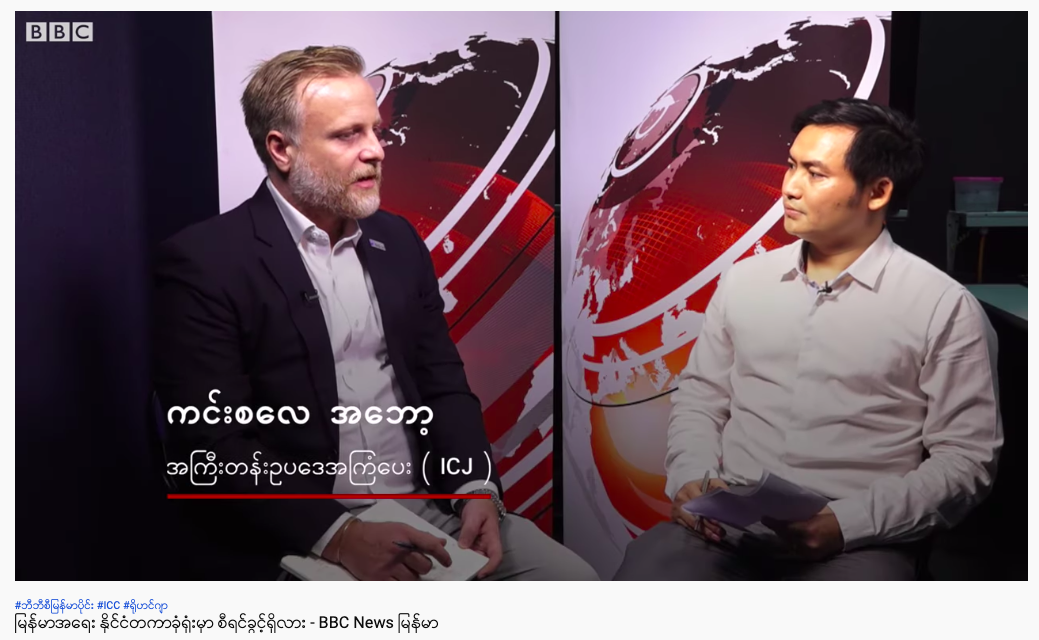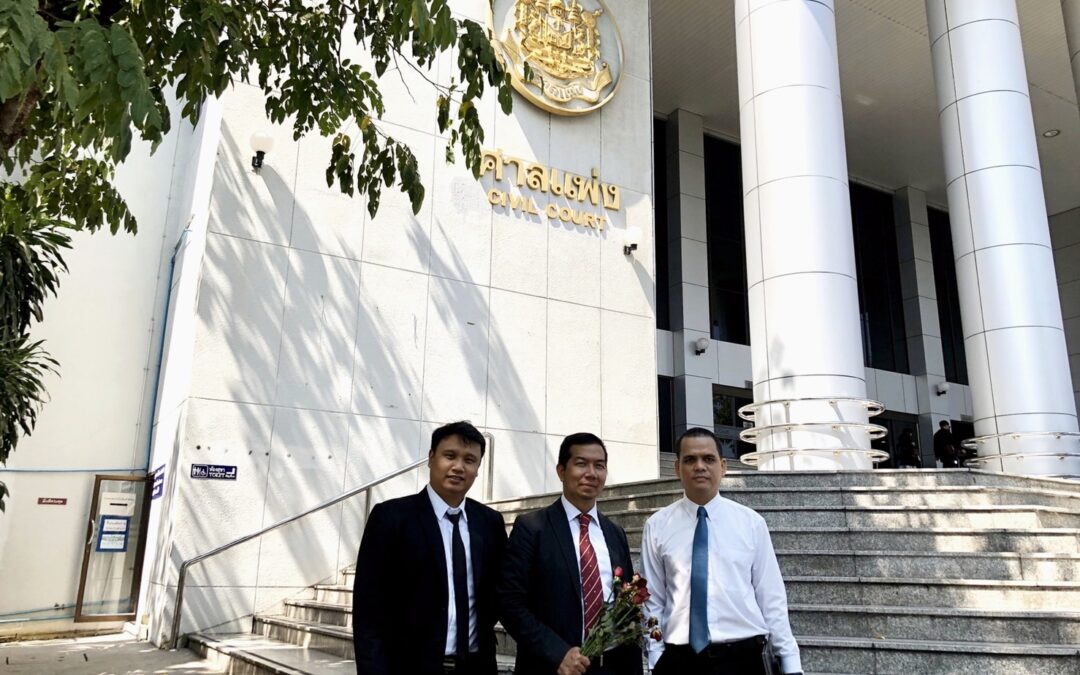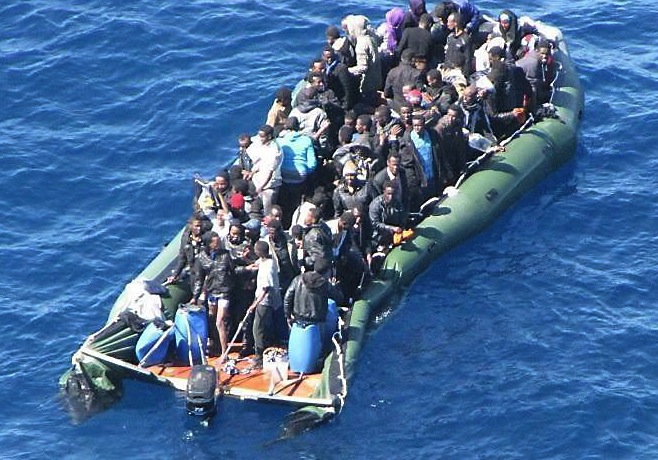
Nov 13, 2019
An opinion piece by Sean Bain, Legal Adviser, ICJ Asia-Pacific Programme, and Jenny Domino, Associate Legal Adviser, ICJ Asia-Pacific Programme.
The National League for Democracy government should use the final year of its term to carry out urgent reforms that would make the Myanmar National Human Rights Commission more effective. This would help promote respect for human rights throughout Myanmar and signal an intention to protect against violations.
Eight years after its establishment, the MNHRC remains generally ineffective, fails to meet international standards on national human rights institutions and is taken seriously by few people in society. This is largely because it lacks independence from government and has done little to address some of the most serious human rights violations in the country, particularly those involving the military. While current commissioners have taken modest steps towards reform, including through a publicly available self-assessment and a strategic plan, more robust action is required to make the MNHRC effective.
In a new legal briefing note, the International Commission of Jurists has identified four reforms that could be implemented immediately to enhance the MNHRC’s ability to protect and promote the human rights of all people in Myanmar. As a non-government organisation of human rights lawyers, the ICJ works with national human rights institutions globally, including in Myanmar. Drawing upon this experience, and on assessments by the MNHRC itself, civil society organisations and the Global Alliance of National Human Rights Institutions, the note describes how the MNHRC could better align itself with the United Nations Paris Principles, which sets standards for national human rights institutions. The MNHRC is currently graded B by the Global Alliance of National Human Rights Institutions, meaning it does not fully comply with the Paris Principles.
First, the President of Myanmar and the Commissioner Selection Board should appoint commissioners who, unlike several of the MNHRC’s incumbents, are properly qualified to promote and protect human rights. This can and should be done promptly, because the commission currently operates with only seven members, the minimum required by the 2014 MNHRC Law. Commissioners should be selected based on human rights expertise, and the overall composition ought to reflect the ethnic, religious, regional, gender and sexual diversity of society. This would boost public trust in the institution among Myanmar’s myriad minority groups. The selection process should also be undertaken transparently and with adequate consultation.
Second, the NLD-dominated Union Parliament should amend the 2014 MNHRC Law to strengthen the commission’s mandate and independence, while improving the commissioner selection process. One of several provisions requiring an overhaul is section 37, which effectively precludes the MNHRC from inquiring into potential human rights violations that are already the subject of a court proceeding. The MNHRC must be empowered to monitor such cases in order to ensure that prosecutions are carried out in a manner consistent with human rights. For instance, in a criminal case, they should be able to assess whether the defendant’s fair trial rights have been violated.
Third, as part of the current effort to amend the 2008 Constitution, the parliamentary Constitutional Amendment Committee should propose new provisions in an amended constitution that would accord the MNHRC constitutional status. The current MNHRC was created under ordinary enabling legislation, meaning it can be altered easily by subsequent law or even decree. Granting constitutional status to the MNHRC would be wise given Myanmar’s political transition: The national human rights institutions of East Timor and the Philippines – which, unlike Myanmar, have “A” ratings from the Global Alliance of National Human Rights Institutions – were established by their respective constitutions when these countries were transitioning to democracy. Constitutional protection would make it easier for the MNHRC to assert itself and preserve its independence, even against a volatile political situation.
While urgently needed, law reform alone will not boost the credibility and effectiveness of the MNHRC. An internal change in the mindset and approaches of its members is also required. Commissioners themselves should take a broad and active interpretation of their mandate, including by taking steps to address the most serious violations that amount to crimes under international law, on which to date they have been mostly silent.
These measures could be implemented immediately and simultaneously. Reform of the 2014 MNHRC Law and the constitution can and should be pursued concurrently, with legislative reform addressing present legal impediments to the commission’s work and constitutional reform according the MNHRC with constitutional status and greater financial independence. Meanwhile, commissioners that reflect a diversity of experience and identities should be appointed, and all members of the MNHRC should take a more active and broad interpretation of their mandate.
These reforms are long overdue and should be pursued without delay to better protect the human rights of all people in Myanmar, and to signal a genuine commitment towards establishing a democratic society based on the rule of law.
To read this Op-Ed in Burmese, click here.
First published in Frontier Magazine on 13 November: https://frontiermyanmar.net/en/time-for-long-overdue-reforms-to-the-human-rights-commission

Nov 13, 2019 | Advocacy, Multimedia items, Video clips
In a video interview with the BBC’s Burmese broadcasting service, ICJ senior legal adviser Kingsley Abbott explains to the Myanmar public how the International Criminal Court prosecutor plans to investigate the crime against humanity of deportation from Myanmar to Bangladesh, which has affected around one million Rohingya.
Recorded on 24 August and published on 12 November 2019. The interview transcript is available in Burmese and English.
Contact
Kingsley Abbott, ICJ Senior Legal Adviser, e: kingsley.abbott(a)icj.org

Nov 12, 2019 | News
Today, the ICJ condemned the use of civil proceedings to harass Nakorn Chompuchart and Sira Osottham, lawyers representing labour rights researcher Andy Hall.
The ICJ called on Thailand to take measures to protect lawyers so that they can perform their duties without intimidation, harassment or improper interference.
On 12 November 2019, the Bangkok Civil Court conducted its first hearing in a tort case under the Civil and Commercial Code by a Thai fruit processing company, Natural Fruit Company Ltd. (‘the Company’), against the lawyers. The two lawyers represent Andy Hall in several criminal and civil proceedings brought against him seeking damages claimed to have resulted from his research into labour rights abuses allegedly committed by the Company. In the lawsuit against the lawyers, the Company is seeking 50 million Thai baht (approximately 1.65 million USD) as compensation for lost business.
“This legal action is part of a pattern of harassment by Natural Fruit against Andy Hall,” said Frederick Rawski, ICJ Asia Pacific Regional Director. “It is a bedrock principle of the rule of law that lawyers should not be identified with their clients or their clients causes as a result of discharging their function.”
In the complaint, Natural Fruit claims that Andy Hall and his lawyers “excessively exercise their rights”, “intentionally damage the Company’s reputation”, and “caused financial loss in their business” when they brought a case in 2017 against the Company, the Company’s lawyers, and public prosecutor for allegedly “giving false testimony” and “filing false complaint” in other criminal proceedings. The case was dismissed by the Supreme Court who was of the view that the Company exercised its right in good faith.
“This is not the first time in Thailand that lawyers have faced the unwarranted threat of criminal or civil prosecution when representing their clients,” said Rawski. “As with the criminal proceedings brought against Sirikan “June” Charoensiri for her professional activities as a lawyer, such vexatious actions set a precedent that endangers the ability of lawyers to effectively represent their clients. The government must take prompt and effective measures to ensure that the safety and independence of lawyers is guaranteed in law and in practice.”
Background
This case was also initially brought against Andy Hall, but was later withdrawn because the Court could not send court writs to Andy as he does not reside in Thailand.
Criminal and civil proceedings have brought against Andy Hall were in relation to the report of a Finnish NGO, Finnwatch, published in January 2013, called Cheap Has a High Price, which alleged that labour rights violations were taking place at Natural Fruit Company.
Thailand is a party to the International Covenant on Civil and Political Rights (ICCPR). Article 14 of the ICCPR guarantees the right of the clients of the concerned lawyers to an effective defense.
UN Basic Principles on the Role of Lawyers also provides that “governments shall ensure that lawyers are able to perform all of their professional functions without intimidation, hindrance, harassment or improper interference” and “shall not suffer, or be threatened with, prosecution or administrative, economic or other sanctions for any action taken in accordance with recognized professional duties, standards and ethics.” Moreover, lawyers should not be identified with their clients or their clients causes as a result of discharging their function.
To download the statement in Thai, click here. (PDF)
Contact
Frederick Rawski, ICJ Asia-Pacific Director, t: +66 64 478 1121; e: frederick.rawski(a)icj.org
Further reading
Thailand: verdict in Andy Hall case underscores need for defamation to be decriminalized
Thailand: amicus in criminal defamation proceedings against human rights defender Andy Hall

Nov 12, 2019 | Advocacy, News
The Government of Myanmar should adopt constitutional and legislative guarantees to enable the Myanmar National Human Rights Commission (MNHRC) to better protect and promote human rights for all persons in the country, according to a new ICJ briefing note.
Entitled Four Immediately Implementable Reforms to Enhance Myanmar’s National Human Rights Commission, the note analyzes the ability of the MNHRC to address various human rights violations, some of which have been found by experts to constitute the most serious crimes under international law. The briefing is available in Burmese and English.
“The NLD-led government should promptly reform the MNHRC Law, allowing for the selection of better qualified and representative Commissioners, and granting them the independence and resources necessary for their work. This reform is a low-hanging fruit for the NLD, and overdue” said Sean Bain, ICJ Legal Adviser.
“At the same time, Commissioners should robustly pursue their mandate, including by advocating for the rights of society’s most vulnerable people,” he added.
The MNHRC itself has recognized the need for law reform, in its self-assessment of 2018, and in its reform proposals to the Government. Any law reform process should be opened up to genuine public consultation, enabling inputs from experts and the general public.
“The MNHRC generally fails to act on reported human rights violations, from crimes by soldiers in border areas through to regular attacks on the press, rendering it ineffective in providing redress to victims,” said Sean Bain, ICJ Legal Adviser. “The MNHRC’s routine inaction in critical cases demonstrates its lack of the necessary independence to stand against state actors, particularly the military,” he added.
One illustrative case is the Commission’s reluctance to further pursue justice for the death in military custody of journalist Ko Par Gyi, whose killers were secretly tried and acquitted in a military court, despite the MNHRC’s finding that a public criminal prosecution was warranted. Commissioners have also been notably silent on gross human rights violations against Rohingyas, perpetrated by Tatmadaw soldiers in the context of “clearance operations”.
The note highlights that the Commission refrains from investigating alleged human rights violations by referencing Section 37 of the 2014 MNHRC Law. This provision is narrowly construed to effectively preclude the MNHRC from conducting inquiries on matters that are already the subject of a legal proceeding.
The composition of the Commission also does not reflect Myanmar’s ethnic, religious, regional and gender diversity, which further erodes its ability to address the conflict-related violations and abuses particularly prevalent in border areas such as Rakhine, Kachin and Shan states.
While amending problematic provisions in the 2014 MNHRC Law is warranted, a constitutional guarantee would also significantly improve the Commission’s institutional independence.
“A constitutional provision, in contrast to ordinary legislation, is subject to a stricter amendment process that would less likely render the MNHRC politically vulnerable,” said Jenny Domino, ICJ Associate Legal Adviser.
“Myanmar can look to the experience of the national human rights institutions of East Timor and the Philippines, which were established by constitutional provision at a time that both countries were transitioning to a democratic and rule of law based order”,” she added.
Four immediately implementable reforms for the Government of Myanmar are recommended:
- To the Union President and the Selection Board: appoint Commissioners through a transparent and fully consultative process that enables its composition to effectively protect human rights and appropriately reflect the full diversity of the population of Myanmar, including ethnic, religious, regional, gender and sexual identities;
- To the Commissioners: adopt a broad and active interpretation of their mandate, including by taking steps to address the most serious violations, including crimes under international law, and certain human rights cases that have gone before courts;
- To the Myanmar parliament: amend the 2014 MNHRC Law to include provisions that strengthen the MNHRC’s capacity and independence, and improve the appointment process for commissioners
- To the Constitutional Amendment Committee: propose provisions guaranteeing the structural and financial independence of the MNHRC in amending the 2008 Constitution.
To download the press release in Burmese, click here.
Download
Myanmar-MNHRC-Advocacy-Briefing-Note-2019-ENG (in English, PDF)
Myanmar-MNHRC-Advocacy-Briefing-Note-2019-BUR (in Burmese, PDF)
Contact
Jen Domino, ICJ Associate Legal Adviser, e: jenny.domino(a)icj.org, t: 09968134317
Daw Hnin Win Aung, ICJ Legal Adviser, e: hninwin.aung(a)icj.org, t: 09428122794
Related material:
Achieving Justice for Gross Human Rights Violations in Myanmar: Baseline Study
Myanmar: Five years without justice for journalist Ko Par Gyi

Nov 11, 2019 | Advocacy, Cases, Legal submissions
Today, the ICJ, the AIRE Centre, ECRE and DCR have submitted a third party intervention before the European Court of Human Rights in the case of a 2017 rescue operation of migrants, including refugees, in the Mediterranean Sea that involved the SeaWatch rescue vessel.
The case, S.S. and Others v. Italy, concerns the facts occurred during a rescue operation coordinated by the Maritime Research and Rescue Centre of Italy in Rome in the middle of the Mediterranean Sea.
It is currently litigated before the European Court of Human Rights where the victims of human rights violations at the hand of the Libya Coast Guard during the operation are suing Italy for breach of their rights under the European Convention on Human Rights.
During the operation, the involved the rescue boat SeaWatch, a French navy vessel and a Libyan Coast-Guard boat. It is reported certain migrants were taken and ill-treated by the Libyan Coast Guard and sent back to Libya.
It is also alleged that actions undertaken by the Lybian Coast Guard boat during the rescue operation caused the death of several persons to be rescued, including children.
The ones rescued by the SeaWatch vessel could join safety on Italian shores.
The interveners have submitted that, in accordance to the Court’s jurisprudence under the European Convention on Human Rights, other sources of international human rights law and international maritime law standards, Italy had jurisdiction for the purpose of the Convention and had, therefore, to ensure that persons involved in the rescue operation would not be exposed to serious violations of their human rights.
ECtHR-SS_v_Italy_final-JointTPI-ICJECREAIREDCR-English-2019 (download the joint third party intervention)
Video
Watch our interview with ICJ Senior Legal Adviser Massimo Frigo as he further defines S.S. and Others v. Italy and what ICJ intends to do.









